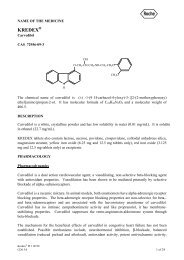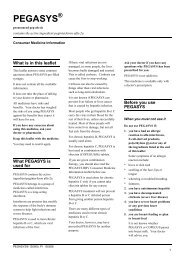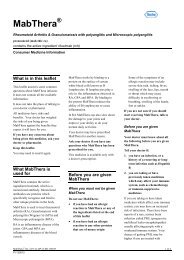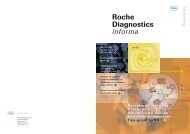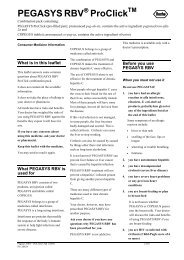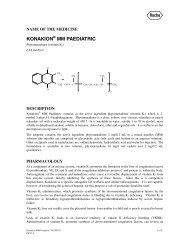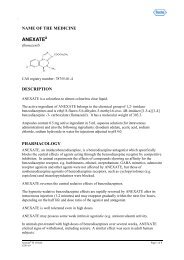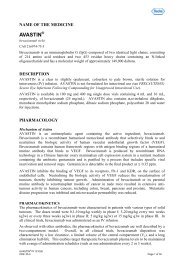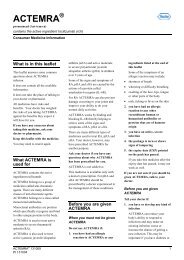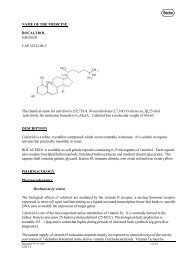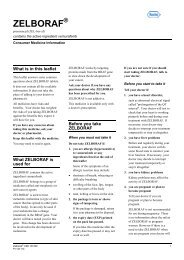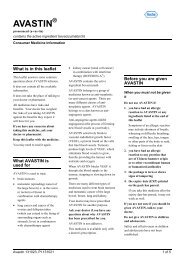Actemra (tocilizumab) Product Information (PI) - Roche Australia
Actemra (tocilizumab) Product Information (PI) - Roche Australia
Actemra (tocilizumab) Product Information (PI) - Roche Australia
You also want an ePaper? Increase the reach of your titles
YUMPU automatically turns print PDFs into web optimized ePapers that Google loves.
Infusion Reactions<br />
In the 6 month controlled trials, adverse events associated with infusion (selected events<br />
occurring during or within 24 hours of infusion) were reported by 6.9% of patients in the<br />
ACTEMRA 8 mg/kg + DMARD and 5.1% of patients in the placebo + DMARD group.<br />
Events reported during the infusion were primarily episodes of hypertension. Events<br />
reported within 24 hours of finishing an infusion were headache and skin reactions (rash,<br />
urticaria). These events were not treatment limiting.<br />
In the 6 month controlled clinical trials, the rate of anaphylactic reactions in those<br />
receiving the lower dose of 4 mg/kg was 3/744 (0.4%) and in the higher dose of 8 mg/kg<br />
was 3/1870 (0.2%). As anaphylactic reactions tend to occur early in the course of<br />
treatment, the overall rate of anaphylaxis cumulatively in the long term extensions<br />
remained at 6/3778 or 0.2%.<br />
Clinically significant hypersensitivity reactions associated with ACTEMRA and<br />
requiring treatment discontinuation, were reported in a total of 13 out of 3778 patients<br />
(0.3%) treated with ACTEMRA during the controlled and open label clinical trials.<br />
These reactions were generally observed during the second to fifth infusions of<br />
ACTEMRA.<br />
Immunogenicity<br />
A total of 2876 patients have been tested for anti-<strong>tocilizumab</strong> antibodies in the 6 month<br />
controlled clinical trials. Forty six patients (1.6%) developed positive anti-<strong>tocilizumab</strong><br />
antibodies of whom 5 had an associated medically significant hypersensitivity reaction<br />
leading to withdrawal. Thirty patients (1.1%) developed neutralising antibodies.<br />
Monotherapy: ACTEMRA vs adalimumab<br />
In a 24 week double-blinded, parallel study (monotherapy with ACTEMRA 8 mg/kg IV<br />
q4w (n=162) compared to adalimumab 40 mg SC q2w (n=162)), the overall clinical<br />
adverse event profile was similar between ACTEMRA and adalimumab. The proportion<br />
of patients with serious adverse events was balanced between the treatment groups<br />
(ACTEMRA 11.7% vs. adalimumab 9.9%) with the most common event being infections<br />
(3.1% each). There was a sudden death in the ACTEMRA arm of a patient who died 10<br />
days after the last dose. The cause of death was unknown. The patient had a history of<br />
peripheral vascular disease, hypertension, smoking and interstitial lung disease. Both<br />
study treatments induced the same pattern of changes in laboratory safety parameters<br />
(decreases in neutrophil and platelet counts, increases in ALT, AST and lipids), however,<br />
the magnitude of change and the frequency of marked abnormalities was higher with<br />
ACTEMRA compared with adalimumab. Four (2.5%) patients in the ACTEMRA arm<br />
and two (1.2%) patients in the adalimumab arm experienced CTC grade 3 or 4 neutrophil<br />
count decreases. Eleven (6.8%) patients in the ACTEMRA arm and 5 (3.1%) patients in<br />
the adalimumab arm experienced ALT increases of CTC grade 2 or higher. For patients<br />
<strong>Actemra</strong> ® <strong>PI</strong> 131004 25 of 37<br />
CDS 8.0



